Last week, I wrote a story incorrectly concluding that a full Linux desktop environment would soon run on Macs with Apple silicon. This was a misunderstanding of the facts.
While some of the work in the Asahi Linux project has been worked into Linux Kernel 6.2, and while Linux 6.2 will be adopted by the next major versions of Ubuntu and Fedora, this does not mean that Apple silicon Macs will be able to boot into these desktop environments.
Linux on Apple silicon Macs: Still a ways to go
“You will not be able to run Ubuntu nor any other standard distro with [Linux] 6.2 on any M1 Mac. Please don’t get your hopes up,” clarifies the official Asahi Linux account on Mastodon.
These basic facts of last week’s story remain true:
- Linux Kernel 6.2 upstreams “basic boot support” for some M1-based computers from the Asahi Linux project.
- Ubuntu 23.04 and Fedora 38 will adopt Linux 6.2.
However, I was wrong when I said that “you’ll be able to boot your Mac straight into Ubuntu rather than run it on top of macOS.”
Comparing last week’s news to the Intel era of the Mac, where you could easily partition your hard drive and boot into Windows or Linux, was also misleading.
What else needs to happen to get Ubuntu working, then?
One of the hangups has to do with memory paging, a feature of every major operating system wherein blocks of memory (RAM) are temporarily swapped over to the computer’s hard drive. This is usually done to make space on a system with a small amount of memory (or when Chrome is running).
Apple silicon uses 16K page sizes. However, “no generic ARM64 distro ships 16K kernels today,” according to the Asahi Linux project.
This is one of presumably many, many problems that must be solved before you will be able to freely install and boot Linux on your new MacBook Pro with an M1 or M2 chip inside.
Basically, the best and most accurate sentence in my original article is this one: “Rewriting big portions of the Linux kernel to take advantage of Apple silicon would be a long, arduous effort.”
It remains so.


